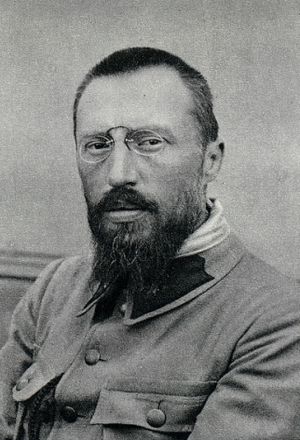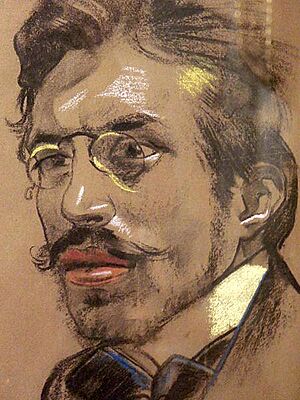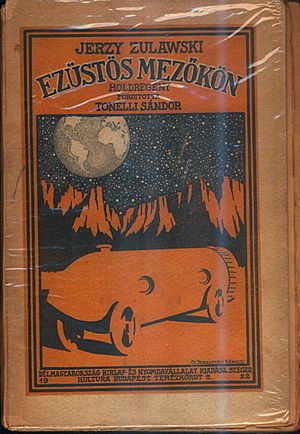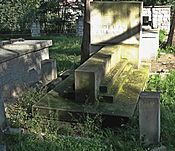Jerzy Żuławski facts for kids
Quick facts for kids
Jerzy Żuławski
|
|
|---|---|
 |
|
| Born |
Jerzy Żuławski
14 July 1874 Lipowiec
|
| Died | 9 August 1915 (aged 41) Dębica
|
| Nationality | Polish |
| Education | University of Bern |
| Occupation | writer, philosopher, translator |
|
Notable work
|
The Lunar Trilogy (1903-1911) Laus feminae (1914-1916) |
| Awards | Cross of Independence |
Jerzy Żuławski (born July 14, 1874 – died August 9, 1915) was a famous Polish writer, thinker, and translator. He was also an alpinist (mountain climber) and a patriot who loved his country. His most well-known work is a science fiction story called Trylogia Księżycowa (The Lunar Trilogy). He wrote this epic tale between 1901 and 1911.
Contents
Jerzy Żuławski's Life and Education

Jerzy Żuławski was born in a village called Lipowiec, near Rzeszów, in a part of Poland then controlled by Austria. His family was very patriotic and loved Poland deeply. His father, Kazimierz Żuławski, had even fought in an uprising against Russian rule in Poland in 1863. This strong love for Poland greatly influenced young Jerzy.
Jerzy went to good schools in different Polish towns like Limanowa and Kraków. From 1892 to 1899, he studied in Switzerland. He first attended the University of Zürich and then earned his doctorate in philosophy at the University of Bern. He studied under a famous philosopher named Richard Avenarius.
Żuławski wrote his main paper, called Das Problem der Kausalität bei Spinoza, about the philosopher Spinoza. It was published in 1899. Later, he turned this paper into a Polish book in 1902. He also translated works by other important thinkers like Nietzsche and Schopenhauer into Polish. He even translated parts of the original Hebrew Old Testament.
Early Writings and Ideas
Jerzy Żuławski's first published book was a collection of poems called Na strunach duszy (On the Strings of the Soul). It came out in 1895 while he was still studying in Bern. After finishing his studies in 1899, he returned to Poland. He worked as a schoolteacher in Jasło and later in Kraków. He also helped edit a literary magazine called Krytyka (Critique).
Żuławski developed his own philosophical idea which he called "synthetic monism". He believed this idea could help solve the problems faced by thinkers of his time, known as the Młoda Polska (Young Poland) movement. He was interested in how culture develops and the role of individuals in society. His main idea was that everything, both spiritual and material, is part of one single reality.
The Lunar Trilogy
By the end of 1901, Żuławski stopped teaching to focus on writing and traveling. He completed the first part of his most famous work, On the Silver Globe. This book tells the story of a Moon expedition that goes terribly wrong. He wrote the last words of this book in Kraków in the winter of 1901-1902.
Like many novels at the time, On the Silver Globe was first published in parts in a magazine called Głos Narodu (The Voice of the Nation) from 1901 to 1902. It was then published as a complete book in 1903.
For five years, it was a single book. But then, between 1908 and 1909, Żuławski published a sequel called Zwycięzca (The Conqueror). This story continued generations later on the Moon. It was longer and more focused on philosophical ideas than the first book. It was published as a book in 1910.
In 1910, the final part of the trilogy, Stara Ziemia (The Old Earth), began to appear. This book continued right after The Conqueror. It followed two small human characters from the Moon who use a spaceship to return to Earth, the planet of their ancestors. The same magazine that published the first book finished the trilogy in 1911, and the complete book version came out later that year.
The full three-volume set of The Lunar Trilogy was first published in 1912. Soon after, it became very popular and was translated into almost every European language.
Family Life and Later Works
In 1907, Żuławski got married for the second time. He had three sons: Marek (born 1908), Juliusz (born 1910), and Wawrzyniec (born 1916).
From 1901, Żuławski often lived in Zakopane, a famous mountain town in Poland. By 1910, he bought a large house there and settled down with his family. He became an editor for a local magazine and welcomed many famous writers and friends to his home. He loved to travel and climb mountains across Europe. He continued to write poems, short stories, essays, and translations for several more years.
World War I and Death
In August 1914, when World War I began, Poland was divided among Russia, Germany, and Austria-Hungary. Jerzy Żuławski felt it was his duty to fight for Poland's freedom. He joined Piłsudski's Legions, a Polish military group.
Because he was a well-known writer, he was given an important job on the Legion's newspaper staff in Łódź. He edited and wrote for their newspaper, Do Broni (To Arms). In 1915, he was assigned to the Legion Headquarters. During a visit to the front lines in early August, he caught typhus, a serious illness. He died a few days later in a hospital in Dębica. He was 41 years old. His third son, Wawrzyniec, was born six months after his death.
Żuławski's Family Legacy
Jerzy's son Marek was named after the main character in his father's book The Conqueror.
After Jerzy's early death, his wife, Kazimiera Żuławska, moved with their sons to Warsaw. Even though the boys didn't get to know their father well, they all loved mountain climbing, just like him.
All three brothers also became famous in the arts:
- Marek became a painter.
- Juliusz followed in his father's footsteps as a poet, novelist, and translator.
- Wawrzyniec became a composer.
During World War II, Kazimiera and her son Wawrzyniec helped hide Jews in their apartment from the German occupiers. This was a very brave act that could have cost them their lives. Because of their courage, both were later recognized as Righteous Among the Nations.
Wawrzyniec, who was also a dedicated mountain rescue specialist, died in 1957 during a rescue mission in the Alps. He was caught in an avalanche and was 41 years old, the same age his father was when he died.
Grand-nephew Andrzej Żuławski
Jerzy Żuławski's grand-nephew, Andrzej Żuławski, became a famous filmmaker and author. In 1972, he moved to France to find more artistic freedom away from the censorship of Poland's Communist government. He became very successful there.
Andrzej Żuławski always wanted to make a movie based on his grand-uncle's Lunar Trilogy. In the mid-1970s, he got the chance to return to Poland and start filming. He spent over two years writing the script and filming parts of the first two books of the trilogy in various locations, including Poland, Crimea, and the Gobi Desert.
However, in 1977, the project was suddenly stopped by a new government official. This official thought the film's story was a hidden message about the Polish people fighting against their government. He ordered all the film materials to be destroyed. Andrzej Żuławski was very upset and returned to France.
Luckily, the unfinished film reels, costumes, and props were saved by the Polish film studio and crew members instead of being destroyed. Eight years later, as political changes began in Eastern Europe, Żuławski was able to return to Poland. He edited the saved film into a 166-minute version of what the finished movie might have been. This film, titled On the Silver Globe, premiered in 1988.
Jerzy Żuławski's Published Works
Poetry
Most of Żuławski's poetry was written between 1895 and 1904. Some of his poems were later collected and published after his death. One of his most famous poems, Do moich synów (To My Sons), was written during World War I and later turned into a song that Polish fighters sang during World War II.
- 1895 - Na strunach duszy (On the Strings of the Soul)
- 1897 - Intermezzo
- 1897 - Stance o pieśni (Songs for Stanca)
- 1900 - Poezje II (Poetry II)
- 1902 - Z domu niewoli (From the House of Enslavement)
- 1904 - Pokłosie (Ears of Grain)
Plays
From 1904 to 1907, Żuławski focused on writing plays. His early plays reminded people of Poland's fight for independence. Later, he explored ideas about human thoughts and the freedom of young people. His most successful play was Eros and Psyche, which used myths and fantasy to show the audience's inner feelings. Many critics found his plays unusual, but audiences generally loved them.
- 1903 - Dyktator (The Dictator) [written to remember the 40th anniversary of the 1863 January Uprising]
- 1903 - Wianek mirtowy (A Myrtle Wreath)
- 1904 - Eros i Psyche (Eros and Psyche), later made into an opera
- 1905 - Ijola (Iolanthe)
- 1906 - Donna Aluica
- 1906 - Koniec Mesjasza (The End of the Messiah) [explores ideas about whether someone can truly save others]
- 1906 - Gra (The Game)
- 1909 - Za cenę łez (For the Price of Tears)
- 1911 - Gród Słońca (The Castle City of the Sun)
Fiction
Żuławski's most famous work is The Lunar Trilogy, first published as a complete set in 1912. While it's an exciting science fiction story, it also explores deep philosophical ideas. It looks at human nature, how we create religious stories, and our desire for a perfect world that might be impossible to reach. The story shows a pessimistic view of human society and civilization.
Jerzy Żuławski wrote many short stories. His only other novels were two volumes of a planned trilogy called Laus Feminae (Latin for Praise to Women). These books were published in parts in journals between 1912 and 1913, and then as books in 1913 and 1914, just before World War I. This work was meant to explore society at the time, but it didn't become as famous as The Lunar Trilogy.
Other Writings
Żuławski wrote many articles for magazines and newspapers. Besides short stories and poems, these included essays about literature and philosophy. Some of these were collected and published after his death. He was also highly respected as a translator of poetry from several languages, including Nietzsche's poems and parts of the original Hebrew Old Testament.
See also
 In Spanish: Jerzy Żuławski para niños
In Spanish: Jerzy Żuławski para niños
- List of Poles
 | Mary Eliza Mahoney |
 | Susie King Taylor |
 | Ida Gray |
 | Eliza Ann Grier |



